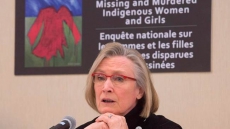WINNIPEG — Manitoba's troubled NDP government will face the opposition in the legislature for a short winter sitting starting today, as the province's April 19 election looms ever closer.
Premier Greg Selinger will continue to stress his plans for the economy, the environment and social justice. He has shown no signs of deviating from his message despite a two-year slump in opinion polls that suggests his government could be facing defeat.
"The polls are the polls. We accept that, but we also know that we're fundamentally committed to making Manitoba a better place to live," Selinger said Tuesday.
"We've got a tremendous number of things that have been accomplished and those things could be at risk if we take on the policies of the opposition parties."
The highlight of the 12-day sitting will be a fiscal update, or mini-budget, that Selinger is scheduled to put forward in early March. He has already pushed back plans to balance the budget twice, after starting a string of deficits in 2009, and in recent months has made it clear that his latest target of 2018 is not carved in stone.
The NDP stirred up public anger in 2013 by raising the provincial sales tax. Recent polls suggest the NDP is 20 points or more back of the Progressive Conservatives and in a dead heat with the Liberals, who have just one legislature seat.
Last week, the first television ad of the election campaign featured Selinger offering an apology to voters and an admission he and his government "haven't always gotten it right."
However, he has continued to maintain the tax hike and deficit spending were needed to help the province's economy.
"I'm wondering what Selinger can do to turn this around, if anything," said Royce Koop, who teaches political science at the University of Manitoba.
"And as time goes by, I'm thinking it's getting harder and harder for him to do so."
Having the legislature in session will allow the government a benefit in terms of communications. Under provincial law, the government cannot advertise or hold news conferences 90 days prior to its fixed-date election. The ban does not extend, however, to speeches and debates in the legislature.
"Journalists have to report on things ... so it's a work-around," Koop said.




